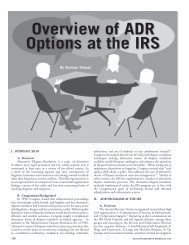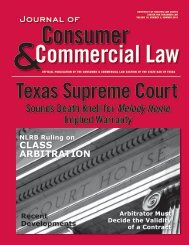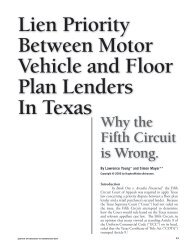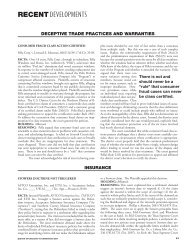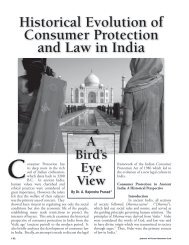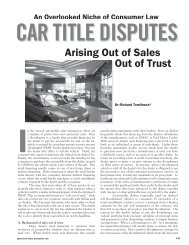Teaching Consumer Credit Law in an Evolving Australian Economy
Teaching Consumer Credit Law in an Evolving Australian Economy
Teaching Consumer Credit Law in an Evolving Australian Economy
Create successful ePaper yourself
Turn your PDF publications into a flip-book with our unique Google optimized e-Paper software.
RECENT DEVELOPMENTS<br />
LAWYER CANNOT ENFORCE ARBITRATION AGREE-<br />
MENT IN RETAINER CONTRACT<br />
Hodges v. Reasonover, ___So.3d ___(La. 2012).<br />
FACTS: In 2007, Pla<strong>in</strong>tiff Hodges sued a comp<strong>an</strong>y <strong>in</strong> federal<br />
court <strong>in</strong> Atl<strong>an</strong>ta regard<strong>in</strong>g a contractual dispute <strong>an</strong>d reta<strong>in</strong>ed<br />
Defend<strong>an</strong>t Reasonover, <strong>an</strong> attorney with whom Pla<strong>in</strong>tiff had<br />
<strong>an</strong> ongo<strong>in</strong>g bus<strong>in</strong>ess relationship s<strong>in</strong>ce 1998. Pla<strong>in</strong>tiff signed<br />
a reta<strong>in</strong>er agreement <strong>in</strong> 2007, which conta<strong>in</strong>ed <strong>an</strong> arbitration<br />
clause. In 2009, Pla<strong>in</strong>tiff <strong>an</strong>d Defend<strong>an</strong>t renegotiated the<br />
reta<strong>in</strong>er agreement. The revised agreement conta<strong>in</strong>ed <strong>an</strong><br />
arbitration clause identical to the one <strong>in</strong> the orig<strong>in</strong>al agreement<br />
<strong>an</strong>d stated “[b]ecause this agreement <strong>in</strong>volves the acquisition<br />
of <strong>an</strong> additional <strong>in</strong>terest <strong>in</strong> your case, <strong>an</strong>d your <strong>in</strong>terests <strong>in</strong> this<br />
tr<strong>an</strong>saction are adverse to ours, you should review this agreement<br />
with <strong>in</strong>dependent counsel.”Pla<strong>in</strong>tiff chose not to reta<strong>in</strong><br />
<strong>in</strong>dependent counsel <strong>an</strong>d signed the revised agreement.<br />
Pla<strong>in</strong>tiff’s claims ultimately failed to survive a motion for<br />
summary judgment. She then sued Defend<strong>an</strong>t for malpractice,<br />
<strong>an</strong>d Defend<strong>an</strong>t filed exceptions based on the arbitration clause.<br />
The district court denied the exceptions based on the Louisi<strong>an</strong>a<br />
Rule of Professional Conduct 1.8(h)(1), which prohibits <strong>an</strong>y<br />
agreement made between <strong>an</strong> attorney <strong>an</strong>d client that limits the<br />
liability of the attorney. It found that the m<strong>an</strong>datory arbitration<br />
clause was a prospective limitation of liability <strong>an</strong>d, because<br />
Pla<strong>in</strong>tiff had not been represented by <strong>in</strong>dependent counsel, the<br />
arbitration clause was <strong>in</strong>valid. Defend<strong>an</strong>t appealed.<br />
HOLDING: Affirmed on other grounds.<br />
REASONING: The court disagreed that the arbitration clause<br />
was a per se limitation on liability, cit<strong>in</strong>g the Federal Arbitration<br />
Act, as well as public policy reasons for enforc<strong>in</strong>g arbitration<br />
clauses. The court then <strong>an</strong>alogized for the decision <strong>in</strong> G<strong>in</strong>ter ex<br />
rel. Ballard v. Belcher, Prendergast & Laporte, 536 F.3d 439 (5th<br />
Cir. 2008), which held that <strong>in</strong>clud<strong>in</strong>g a forum-selection clause<br />
<strong>in</strong>to <strong>an</strong> attorney-client agreement is usually not a limitation on<br />
malpractice liability. The court held that provided a b<strong>in</strong>d<strong>in</strong>g arbitration<br />
clause (1) provides<br />
for a neutral decision maker,<br />
(2) is otherwise fair <strong>an</strong>d reasonable<br />
to the client, <strong>an</strong>d (3)<br />
does not limit the attorney’s<br />
subst<strong>an</strong>tive liability, it does<br />
not violate the Louisi<strong>an</strong>a<br />
Rule.<br />
The court found, however,<br />
that <strong>in</strong> the <strong>in</strong>st<strong>an</strong>t case,<br />
Defend<strong>an</strong>t did not adequately<br />
disclose the full scope of<br />
the arbitration clause <strong>an</strong>d<br />
the potential consequences of agree<strong>in</strong>g to b<strong>in</strong>d<strong>in</strong>g arbitration,<br />
<strong>an</strong>d affirmed the lower court. The court held that attorneys, by<br />
virtue of their legal education <strong>an</strong>d tra<strong>in</strong><strong>in</strong>g, have <strong>an</strong> adv<strong>an</strong>tage<br />
over clients, who may not underst<strong>an</strong>d the arbitration process <strong>an</strong>d<br />
the full effects of <strong>an</strong> arbitration clause. The court then laid out<br />
the necessary disclosures that attorneys must give to their clients,<br />
<strong>in</strong>clud<strong>in</strong>g waiver of the right to a jury trial, waiver of the right<br />
to <strong>an</strong> appeal, waiver of the right to broad discovery, <strong>an</strong>d the possibility<br />
of subst<strong>an</strong>tial upfront costs compared to litigation.<br />
Defend<strong>an</strong>t did not<br />
adequately disclose<br />
the full scope of the<br />
arbitration clause<br />
<strong>an</strong>d the potential<br />
consequences of<br />
agree<strong>in</strong>g to b<strong>in</strong>d<strong>in</strong>g<br />
arbitration.<br />
ARBITRATION CLAUSE DOES NOT COVER JOB<br />
APPLICANT<br />
Gove v. Career Sys. Dev. Corp., 824 F. Supp. 2d 205 (2011).<br />
FACTS: Pla<strong>in</strong>tiff applied for a position as a medical clerk with<br />
Defend<strong>an</strong>t comp<strong>an</strong>y. Pla<strong>in</strong>tiff’s employment application <strong>in</strong>cluded<br />
a reference to Defend<strong>an</strong>t’s dispute resolution <strong>an</strong>d arbitration<br />
policy, which stated that submission of the application constituted<br />
<strong>an</strong> agreement to arbitrate <strong>an</strong>y pre-employment disputes. While<br />
the policy was not directly attached to Pla<strong>in</strong>tiff’s application<br />
for employment, the application stated that it was on display <strong>in</strong><br />
Defend<strong>an</strong>t’s employment office <strong>an</strong>d would be provided to Pla<strong>in</strong>tiff.<br />
Pla<strong>in</strong>tiff, a visibly pregn<strong>an</strong>t wom<strong>an</strong>, <strong>in</strong>terviewed for a position with<br />
Defend<strong>an</strong>t. Defend<strong>an</strong>t commented on her pregn<strong>an</strong>cy <strong>an</strong>d asked<br />
how much longer until she was due. Pla<strong>in</strong>tiff was not selected for<br />
employment, <strong>an</strong>d Defend<strong>an</strong>t cont<strong>in</strong>ued to advertise the position<br />
after <strong>in</strong>form<strong>in</strong>g her she had not been selected. Pla<strong>in</strong>tiff filed suit<br />
alleg<strong>in</strong>g Defend<strong>an</strong>t’s failure to hire her was due to her gender<br />
<strong>an</strong>d pregn<strong>an</strong>cy <strong>in</strong> violation of the Ma<strong>in</strong>e Hum<strong>an</strong> Rights Act <strong>an</strong>d<br />
Title VII of the Civil Rights Act. Defend<strong>an</strong>t filed a motion to<br />
compel arbitration along with a copy of Pla<strong>in</strong>tiff’s employment<br />
application <strong>an</strong>d the arbitration policy.<br />
HOLDING: Motion denied.<br />
REASONING: In its consideration of Defend<strong>an</strong>t’s motion to<br />
compel arbitration, the court followed Section 3 of the Federal<br />
Arbitration Act (FAA) which requires a determ<strong>in</strong>ation of (1)<br />
whether there is <strong>an</strong> agreement to arbitrate, (2) whether the<br />
dispute <strong>in</strong> question falls with<strong>in</strong> the scope of that arbitration<br />
agreement, <strong>an</strong>d (3) whether the party see<strong>in</strong>g arbitration has<br />
waived the right to compel arbitration. “Whether a party agreed<br />
to arbitrate a particular dispute is . . . a matter of contract.”<br />
Johnson v. Circuit City Stores, Inc., 148 F.3d 373 (4th Cir. 1998).<br />
Under ord<strong>in</strong>ary Ma<strong>in</strong>e contract law the court must <strong>in</strong>terpret the<br />
effect of the parties’ <strong>in</strong>tentions <strong>in</strong> the document; however, the<br />
FAA requires a presumption <strong>in</strong> favor of arbitration.<br />
The court determ<strong>in</strong>ed that Pla<strong>in</strong>tiff had little to no<br />
barga<strong>in</strong><strong>in</strong>g power when she entered <strong>in</strong>to the agreement <strong>an</strong>d<br />
construed <strong>an</strong>y ambiguities aga<strong>in</strong>st the Defend<strong>an</strong>t drafter. With<strong>in</strong><br />
the arbitration policy, Defend<strong>an</strong>t referred to “employment”,<br />
“employment process,” <strong>an</strong>d “its employees” which the court<br />
found to suggest that the arbitration agreement applies if the<br />
applic<strong>an</strong>t is hired <strong>an</strong>d becomes <strong>an</strong> employee. The court found<br />
ambiguities as to whether the arbitration policy applied to job<br />
applic<strong>an</strong>ts who did not receive <strong>an</strong> employment offer, because it<br />
also referred to pre-employment disputes. The court determ<strong>in</strong>ed<br />
that the clause was drafted to apply only to job applic<strong>an</strong>ts who<br />
later become employees, because to <strong>in</strong>corporate applic<strong>an</strong>ts who<br />
were not eventually hired would require specific l<strong>an</strong>guage.<br />
Further, the fact that the Pla<strong>in</strong>tiff was delivered a st<strong>an</strong>dard-form<br />
employment application gave Defend<strong>an</strong>t all of the draft<strong>in</strong>g <strong>an</strong>d<br />
barga<strong>in</strong><strong>in</strong>g power. Due to such <strong>an</strong> imbal<strong>an</strong>ce, the court was<br />
required under Ma<strong>in</strong>e law to construe the ambiguities <strong>in</strong> favor<br />
of Pla<strong>in</strong>tiff, hold<strong>in</strong>g that, as <strong>an</strong> applic<strong>an</strong>t who was not hired,<br />
the arbitration policy did not <strong>in</strong>corporate her <strong>an</strong>d require her to<br />
arbitrate her pre-employment dispute.<br />
52 Journal of <strong>Consumer</strong> & Commercial <strong>Law</strong>



